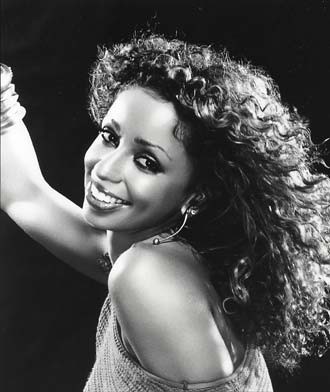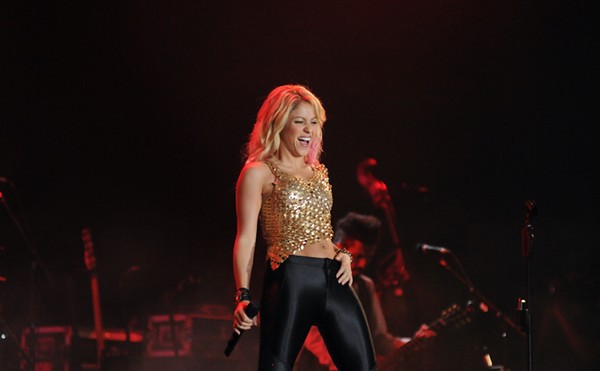| Mya: Her cover of "Free Fallin'" is like ... wo. |
Remember the 1989 Tom Petty hit "Free Fallin'"? If so, you will recall that this insistently simple jangle-fest told the tale of a "bad boy" who breaks the heart of a girl who's "crazy about Elvis" and "loves Jesus, and America too."
R&B songbird Mya remembers the song too, and obviously liked it enough to include it on her new CD, Moodring. But even though she dutifully credits Petty and his co-writer Jeff Lynne, Mya's "Free Fallin'" isn't the song Petty made famous.
Mya keeps Petty's distinctive chord progression - albeit played on piano instead of acoustic guitar, and sped up considerably - and the chorus hook, although she tweaks the lyric from "Now I'm free, free fallin'" to "She was free, free fallin.'"
The rest of the song, though, is a brand-new entity, a confused story about a lost soul looking to Jesus Christ for direction: "She's livin' on her own/prayin' for serenity/to stay strong for the family, yeah." Considering that much of Moodring is personified by its flagship single, an aural lapdance in which Mya boasts that her "ass is like ... wo," it's little wonder that the incongruous Jesus worship of "Free Fallin'" is saved for the end of the disc.
Mya's revamped "Free Fallin'" represents a peculiar, creative hybrid that has long been a staple of hip-hop, but has only recently become common in R&B and pop. It takes two subtly distinct forms: covers that are too altered to really be covers, and originals that borrow too much from other material to really be original.
It's an approach rooted in hip-hop's post-modern aesthetic: that taking apart a favorite old track - keeping the parts that you like, discarding what you don't, and putting the results in a new rhythmic context - can be a valid form of creativity. As a result, it's changing the definition of pop songwriting.
Over the years, hip-hop has served up innumerable examples of this approach: Coolio's "Gangsta's Paradise" (Stevie Wonder redux), Puffy's "I'll Be Missing You" and "Come With Me" (with Sting and Jimmy Page, respectively, giving their blessings by making guest appearances), N.W.A.'s adaptation of Charles Wright's 1970 soul classic, "Express Yourself," and on and on.
But in pop music, such revised remakes have been rarer. In 1964, the Beach Boys' Brian Wilson put new lyrics on Chuck Berry's "Sweet Little Sixteen" and called it "Surfin' U.S.A." Nearly 20 years later, Cyndi Lauper rewrote several lines in Robert Hazard's song, "Girls Just Want to Have Fun," because she considered the original lyric to be sexist. And blues-besotted English rockers like Led Zeppelin regularly lifted riffs and verses from the Chess Records catalog.
| It ain't the same ol' song with Beyonce's "Be With You," a "cover" of Shuggie Otis' "Strawberry Letter 23." |
But as sampling began to make it easier for hip-hop producers to stitch together their favorite bits from various sources, the old rules flew out the window. So now a new generation of pop and R&B performers see no reason why they can't rewrite old classics to suit their own identities.
On her recently released solo debut CD, Beyonce Knowles sets new lyrics to the tune of Shuggie Otis' standard "Strawberry Letter 23" and calls the resulting song "Be With You." Not surprisingly, this Missy Elliott-produced track credits a veritable army of songwriting collaborators: Knowles, Rich Harrison, Angela Beyince, Shuggie Otis, George Clinton Jr., William Colins, and Gary Cooper.
R&B's most hip-hop-indebted singer, Mary J. Blige, has been at the partial-rewrite game for a few years. On back-to-back tracks of her 1999 album, Mary, she appropriated Stevie Wonder's "I Can't Help It," Elton John's "Bennie and the Jets" and Burt Bacharach's "April Fools," and created new titles from them.
With Blige, you always sense the thrill she feels at being able to write her own version of a Stevie Wonder song. In a way, she represents everyone who grew up singing along with the radio, but could never manage to get the words right. •

















